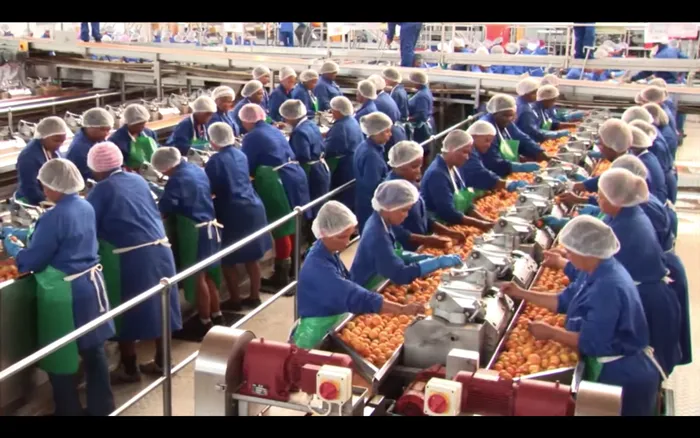Tiger Brands finalises sale of Langeberg and Ashton Foods, safeguarding 3 000 jobs
FOOD PRODUCER

Workers at fruit business Langeberg & Ashton Foods (LAF), a division of Tiger Consumer Brands. LAF will now be owned by the Ashton Fruit Producers Co-operative and Norwegian development finance institution Norfund.
Image: Langeberg & Ashton Foods/YouTube
Tiger Brands has completed the disposal of its Langeberg and Ashton Foods (LAF) operation in the Western Cape, a move that has secured 3 000 jobs and paved the way for the reopening of its tomato purée and canned deciduous fruit business.
The food producer announced on Tuesday that all conditions precedent for the transaction had been met, making the deal effective from 1 October 2025.
“Shareholders are advised that all conditions precedent have been fulfilled and, accordingly, the Transaction is effective Wednesday, 1 October 2025. This marks a significant milestone for Tiger Brands and an exciting new chapter for LAF,” Tiger Brands said.
LAF will now be owned by the Ashton Fruit Producers Co-operative and Norwegian development finance institution Norfund. The business was Tiger Brands’ major international business, exporting canned deciduous fruit products and tomato puree from South Africa’s Breede River Valley.
Tiger Brands sold the business for a symbolic R1 as part of its strategy to sharpen focus on its core domestic operations.
Shares in the company edged 0.45% higher in Tuesday afternoon trade on the JSE, recovering from recent declines of 3.86% and 2.39% over the past week and month, respectively. Operations at Ashton are expected to resume this month.
In May, the company said it had through its wholly owned subsidiary, Tiger Consumer Brands Limited, entered into a sale of business agreementfor the disposal of Langeberg and Ashton Foods business.
As part of the transaction, Tiger Brands has committed R150 million towards establishing a Community Trust to drive socio-economic initiatives in the broader Langeberg region. The Trust will focus on food security, education, youth development, and healthcare access.
A portion of the funds will be invested in the new LAF Company in exchange for a 10% equity stake, while the remainder will finance community programmes.
“This Trust underpins Tiger Brands’ commitment to distributing social and economic benefits to the community of Langeberg long after the Company’s exit, aligned to our values and purpose of nourishing and nurturing more lives every day,” said Tiger Brands.
Pindie Nyandoro, Norfund’s regional director for Southern Africa, said the transaction represented “a unique opportunity to secure jobs and local ownership” in a business that had immense growth potential and was vital for the surround area.
Tiger Brands CEO, Tjaart Kruger, said the new owners of the business bring “considerable agricultural sector expertise and insights, along with a vested interest in the sustainability” of the operation.
“It had taken the company about five years to finally settle for Ashton Fruit Producers Co-operative and Norfund as preferred purchasers for the business,” he said.
In addition to the establishment of a community trust, Tiger Brands also committed to completing an effluent-treatment plant upgrade with a further investment of R31m.
This ensures that the business will continue to “adhere to environmental regulations and is in line with the environmental stewardship pillar of its sustainable futures” strategy.
Tiger Brands initially invested in Langeberg in the 1980s, subsequently delisting the entity after buying out minority shareholders in the entity. At the time, Langeberg ranked among South Africa’s largest tomato, fruit, and vegetable canning businesses, boasting of leading brands such as All Gold and Koo.
In 2005, as the South African canned fruit industry consolidated, Langeberg merged with family-owned business Ashton Canning Company, forming Langeberg and Ashton Foods.
BUSINESS REPORT